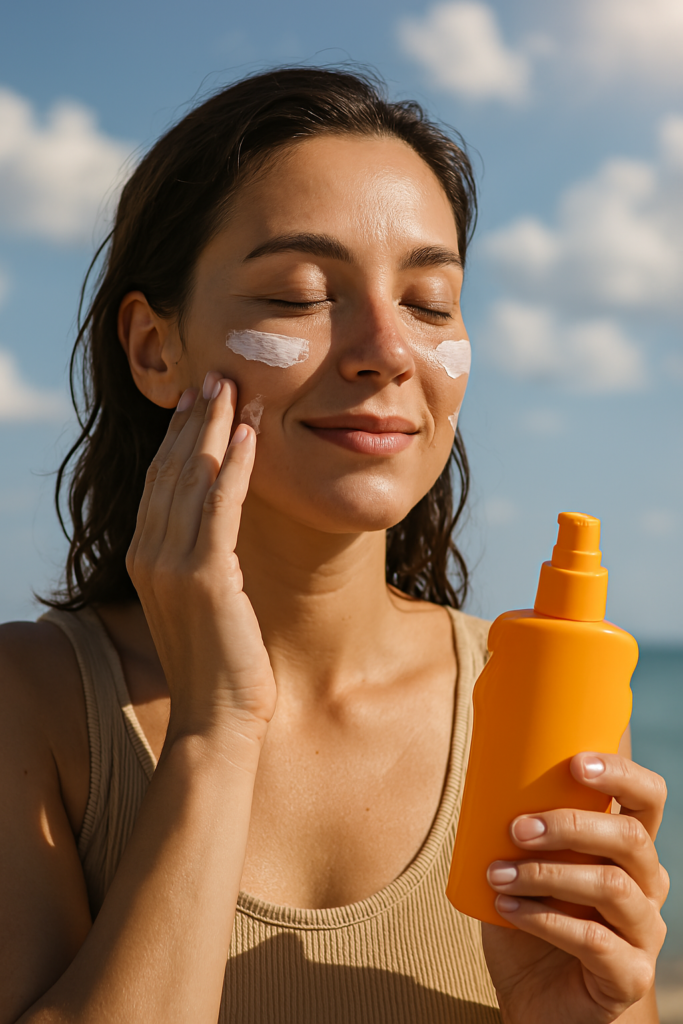Sunscreen is often seen as a summer essential. When the weather is sunny and bright, applying sunscreen feels like a must-do task before heading outdoors. However, many people tend to skip sunscreen during the colder months or on cloudy days, mistakenly believing that the sun’s rays are not as potent. The truth is, harmful UV rays are present year-round, regardless of the weather. In this blog, we will dive deep into why you need sunscreen every season and why you should apply SPF even on cloudy days.
Understanding UV Radiation: What You Need to Know
To understand why sunscreen is necessary throughout the year, let’s first explore the two primary types of ultraviolet (UV) rays that affect our skin:
- UVA Rays: These rays penetrate deeply into the skin and are primarily responsible for premature aging and wrinkles. They can also contribute to skin cancer.
- UVB Rays: UVB rays are responsible for sunburns and play a key role in the development of skin cancer.
Both UVA and UVB rays can damage your skin even on cloudy days or in the winter months. UVA rays, in particular, can pass through clouds and windows, meaning you’re still exposed to harmful radiation.
Cloudy Days Don’t Shield You from UV Radiation
It’s a common misconception that on overcast days, you don’t need to worry about the sun’s harmful effects. However, clouds only block about 20% of UV radiation, meaning that up to 80% of harmful UV rays can still reach your skin. These rays are strong enough to penetrate the skin, even if you can’t see the sun. The risk is not just about getting a sunburn; long-term exposure can lead to skin aging, dark spots, and an increased risk of skin cancer.
In fact, UV rays are reflected by surfaces like water, snow, and even asphalt, which means they can still reach you indirectly. If you’re skiing on a snow-covered mountain or even walking along the beach, you’re likely to be exposed to higher levels of UV radiation.
The Importance of SPF: Not Just for Sunny Days
SPF, or Sun Protection Factor, is a measure of how well a sunscreen protects your skin from UVB rays. The higher the SPF number, the more protection it provides. For example, an SPF 30 sunscreen will block about 97% of UVB rays, while SPF 50 blocks about 98%.
Why SPF is Necessary Year-Round:
- Preventing Skin Damage: Regular use of SPF helps protect against UV radiation that causes skin damage, such as premature aging, wrinkles, and discoloration.
- Protecting Against Skin Cancer: Prolonged UV exposure is one of the leading causes of skin cancer. By using sunscreen consistently, you’re reducing your risk of developing this serious condition.
- Boosting Skin Health: Sunscreen helps maintain an even skin tone and prevents the formation of dark spots, age spots, and redness caused by UV exposure.
Choosing the Right Sunscreen for Every Season
When selecting sunscreen for different seasons, it’s important to consider factors like skin type, SPF level, and specific ingredients. Here’s a quick breakdown of what to look for:
| Season | Sunscreen Type | SPF Level | Additional Considerations |
|---|---|---|---|
| Summer | Broad-spectrum, water-resistant | SPF 30 or higher | Reapply every 2 hours, after swimming or sweating |
| Winter | Broad-spectrum, moisturizing | SPF 30 or higher | Windburn can make skin more sensitive |
| Cloudy Days | Broad-spectrum, lightweight | SPF 30 or higher | Choose a non-greasy formula for daily use |
| Spring/Fall | Broad-spectrum, antioxidant-rich | SPF 30 or higher | Protects from the lower but still present UV rays |
How UV Rays Affect Your Skin in Different Seasons
Although it might feel like winter or cloudy weather is more “gentle” on your skin, UV rays still have a powerful impact, especially on exposed areas like the face, ears, and hands. In fact, winter sun can be even more harmful in certain environments, such as snowy areas, where UV rays bounce off the snow and intensify the exposure.
For those living in colder climates, the absence of sunburn doesn’t mean protection isn’t needed. Even if you’re indoors, UV rays can still penetrate windows. As for cloudy days, the risk remains high because most people mistakenly believe that their skin is protected by the cloud cover.

SPF Myths and Facts: Debunking Common Misunderstandings
Let’s clear up some common misconceptions about sunscreen and UV radiation:
- Myth 1: “I don’t need sunscreen on cloudy days.”
- Fact: As mentioned earlier, UV rays can penetrate clouds, meaning your skin can still get damaged even when it’s overcast.
- Myth 2: “Sunscreen only protects against sunburn.”
- Fact: Sunscreen also protects against long-term skin damage such as wrinkles, premature aging, and even skin cancer.
- Myth 3: “If I have darker skin, I don’t need sunscreen.”
- Fact: While darker skin has more melanin, which offers some protection, it is still susceptible to UV damage, and sunscreen should still be applied to prevent skin damage.
Conclusion: Sunscreen is a Year-Round Essential
Sunscreen is not just for hot summer days; it’s a year-round necessity to protect your skin from the harmful effects of UV radiation. Whether it’s bright and sunny or cloudy, your skin is always exposed to UV rays. For best results, choose a broad-spectrum sunscreen with at least SPF 30 and apply it consistently, regardless of the season.
Don’t skip sunscreen on cloudy days or in the winter months. Protecting your skin is crucial for maintaining a healthy, youthful appearance and reducing your risk of skin cancer.
FAQs About Sunscreen for Every Season
1. Do I need sunscreen on cloudy days? Yes, UV rays can still reach your skin on cloudy days, so it’s important to apply sunscreen even when the sky is overcast.
2. What SPF should I use during winter? For winter, use a broad-spectrum sunscreen with at least SPF 30, especially if you’re exposed to snow, which can reflect UV rays and intensify your exposure.
3. Can sunscreen prevent skin cancer? While sunscreen cannot completely eliminate the risk, it significantly reduces your chances of developing skin cancer by protecting your skin from harmful UV rays.
4. How often should I reapply sunscreen? Sunscreen should be reapplied every two hours or immediately after swimming, sweating, or towel drying.
5. Is sunscreen safe for sensitive skin? Yes, there are sunscreens formulated specifically for sensitive skin, typically containing mineral-based ingredients like zinc oxide or titanium dioxide.
For more information on skin care, you can visit Healthy Vibe Hub.
This blog covers the key points about sunscreen use throughout the year, even on cloudy days, and includes useful tables for better understanding. Let me know if you need anything else or if you’d like to adjust the content further!

